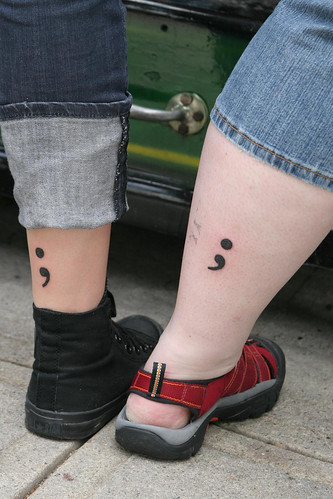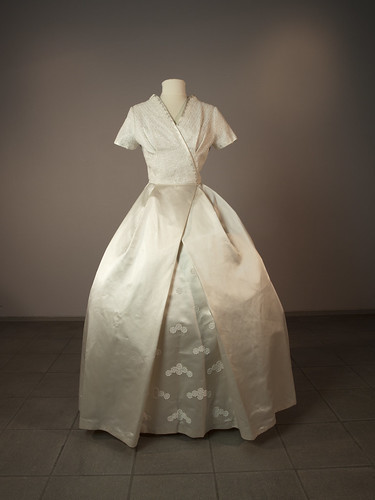The content is not hard. It should probably embarrass me to admit just how much fun identifying all of those verbs, adverbs, nouns, and prepositions can be. I truly enjoy explaining the comma rules for subordinating and coordinating conjunctions. I love the places where grammar feels set and the places where the rules make no sense. I'm a grammar geek. It's fun!
Teaching grammar is still hard for me.
It's hard because I don't know how to feel about it.
My students, for the most part, know exactly how to feel about it. It is to be feared and revered. I ask early in the semester what they want to improve about their writing. They are quick to list off their past grammatical transgressions like sins in the confessional: "subject-verb agreement," "tense shifts," "comma splices." They know the words, and the know that they've erred, but no matter how many worksheets full of sentences I give them, no matter how many comma rules I go over, no matter how many interactive grammar games I devise, that knowledge doesn't translate into clearer grammatical writing.
So, for a while, I throw grammar aside. I teach the higher order concerns. I talk about organization and introductions, transitions and thesis statements, conclusions and avoiding wordiness. Sometimes, my students get frustrated. Why can't I just teach them where to put the commas?
I tell them they're worrying about hanging up curtains when they haven't even built any walls.
I meant it. They have held onto grammar errors far too long. They have told themselves that if they could only figure out the commas, they could be strong writers. They have used grammatical flaws as a scapegoat to mask incomplete thoughts and poorly organized arguments. They needed to learn to build walls.
But now the semester is almost over, and it's time to hang up some curtains.
The problem is that my metaphor holds true a little too well. There's a fairly objective way to determine if a wall is properly constructed. We can measure whether it stands up straight and if it's stable. We can check for its strength and see if it holds up to the weather. Just as there are different materials with which one can construct a wall, there are different ways a student could organize a paper, but just like I can tell when a wall isn't standing, I can tell when the organization isn't working. Grammar, though, like curtains, is often a matter of taste.
I've written about this before, but I'm caught in a space where I have to evaluate my students' work by standards that I recognize as unfair.
My instinct (and what I attempt to do) is to put it all out on the table and just be honest with my students. I want to explain to them that grammar isn't as cut and dry as they may have been led to believe, and I want them to know that there is no such thing as "proper" grammar. I also want them to know that there are, however, different discourse communities and that access to many of them is determined through grammar.
To help demonstrate this, I have them read "Grammar: A Matter of Fashion." This article does a great job of comparing grammar choices to fashion choices. It looks at historically accepted grammar conventions and how they change over time, just like hemlines and button sizes. It helps me explain that there is, in fact, no one "proper" grammar, but rather a shifting set of grammar conventions that we choose depending on our setting. I tell my students that, just as they wouldn't wear their pajamas to a job interview, there are certain grammatical conventions they wouldn't use in a cover letter.
That, of course, doesn't tell the whole story. It's a great starting point for discussing how different uses of grammar are interpreted in different ways, but that particular article stays away from discussions of identity politics in grammar choices. The fashion metaphor holds, though, so it's one way to enter into the conversation. Most of my students are familiar with certain places banning sagging pants or do-rags as a coded way of banning the people most likely to be wearing them: black people. It's also no coincidence that the grammar rules that my students get told again and again are most important are the ones that point out the difference between Black Vernacular English and "Standard" English.
Most of my students are black, and I am white. It puts me in a weird position of strained ethos to discuss the prejudice surrounding grammar discussions. I have authority in the front of the room, but I have no authority in this experience. I've benefited from the privilege of having my grammar--for the most part--match the "standard" my whole life. So, this semester, I broached the subject by having my students read this Washington Post article on how the American Sign Language used by white people differs from that used by black people.
The students really enjoyed the discussion and shared a lot of great experiences and insights into how grammar is used to make assumptions and draw lines. By the end of the conversation, we'd examined some of the prejudices involved and had clearly established that there is no "proper" grammar. My students were involved and energized by the conversation.
Which is why I'm at this hard place. I loved the conversation that we had, and I'd love to let it stop there, but I can't. These are developmental writing students. They have already been singled out as needing extra help with their writing, and I think we've come a long way in building the walls, but I also know that they're going to be judged by which curtains they put up.
I don't want to tell them what those curtains should look like, but I do want to make sure that they know how they're going to be viewed.
This week, then, I'm having them read "I Won't Hire People Who Use Poor Grammar. Here's Why" by CEO Kyle Wiens. He says he gives every potential employee, regardless of position, a grammar test. Those who don't pass aren't hired. He says that grammar is important because it shows professionalism and attention to detail.
It feels a little mean to throw this at them after we've had this great "all grammar is good grammar" discussion, but I think that I'd be irresponsible to not discuss not only the way they can make grammar work for them but also how others can use grammar against them.
I don't know how well the conversation is going to work, but I feel like--at the very least--I'll have been straight with my own misgivings over grammar. They'll have it all on the table and can make an informed decision about how they want to handle their own grammatical choices. And once we get that established, we can get down to the fun work of discussing parallel construction and semi-colon placement.
Photos: shinyredtype, haglundc, Nordenfjeldske Kunstindustrimusem




Wow, that article about the difference between white and black Americans' sign language was really interesting- I had never thought about that. :) And it sounds like you are learning things from your students as you teach them too.
ReplyDeleteDefinitely! Learning from students is one of the best perks of being a teacher!
DeleteExcellent article Jane.
ReplyDeleteI just discovered your blog and LOVE it. I taught Composition I and II at community college for several years and my personal feelings concerning the importance of proper grammar usage in student writing is very similar to yours, especially since my Master's degree in Linguistics opened my eyes to just how ever-changing the rules of syntax are in every language. I can't applaud you enough for giving your students that insight; so many people tie their professional potential based on their writing skills and it has made me cry to witness how closely self-esteem is tied to writing.
ReplyDeleteI agree that the system is unjust to developmental students. My student demographic was predominantly English as a second language speakers. They were incredibly intelligent individuals who spoke English competently, but not perfectly. Most students made it through Developmental Writing, only to be stopped short by Composition I and II due to the strict requirements by many professors. I showed my students syllabi from other professors stating that if an essay had 3 grammar errors, it earned a failing grade. It was heartbreaking to see some fail Composition II (with other instructors) repeatedly and give up on a degree. I felt like all I could do for my "kids" was encourage them to use the free tutoring services extensively and tell them that it didn't matter how grammatically accurate an essay was if the ideas communicated were (pardon my French) crap.
Thank you so much for reading!
ReplyDeleteI've seen similar "three strikes and your out" type syllabi, and it really frustrates my goal of getting my students to see language use as rhetorical and purposeful. If their future teachers are going to boil everything they write down to an arbitrary "perfection" rather than a situational form of communication, I don't know how to teach them to use language. If it's that discouraging for me, I can't even imagine how discouraging it must feel for them.
Thanks for the very thoughtful comment!
ReplyDeleteYou've hit on a lot of things that I've noticed and think are very important. The pressure to be a positive representative for a group that society looks on negatively can be really stifling, and I've never seen the tie between language and identity shown so clearly as when other people get upset that one of "their own" is talking differently. (While I know this is most pronounced among race lines, I (a white woman who grew up in a poor rural family) have experienced it among my own family, too. Coming back from college, I was sometimes asked why I was "talking so smart" and if I thought I was better than them now.) If I spend enough time at home, a rural drawl will come back into my speech and I'll start using more slang. We adapt to the environments that we're in the most because language is flexible. It's one of the most amazing things about human beings' capacity for language, but it also is at the heart of all of these social tensions.
I'm especially interested in this question you asked: "Why is it ok to speak forms of English considered incorrect?"
For me, the answer to that is that there is no "correct" form of English (or, alternately, they are all "correct.") Language is constantly changing and the rules aren't the same for every situation. If I went into the grocery store and started using academic jargon with the clerk, I'd get funny looks (even if s/he understood me perfectly fine). Likewise, if I walk into a job interview using street slang, even if the interviewer is perfectly versed in street slang him/herself, I'm going to lose points for presentation. We all code switch, but code switching has become so much more meaningful for racial minorities because of the very pressures that you so powerfully speak about in your comment.
As a teacher, my goal is to give my students the tools they need to feel comfortable in *any* language situation. I want them to know the Standard Academic English by which their papers and job applications will be judged, but I also want them to know that there is nothing inherently "better" about that language than any other variety they might speak. That's true for my students of any race or from any place. My student who comes in speaking California surfer slang and my student speaking a southern Arkansas dialect are speaking perfectly appropriate languages that have developed organically and logically. There is simply enough power behind the Standard Academic English to allow it to be wielded as a weapon to close off doors to people who don't fit the mold, a mold that was arbitrarily chosen.
Thanks for the response.
ReplyDeleteI think you're right, but at the same time I wonder as the world becomes more interconnected will the acceptance of non-standard change. There will always be different dialects, but in terms of people who speak a common language I wonder if we'll see a decrease in variation, or more so acceptance of it. Then again we're humans and eventually everything becomes slang....or we change the meaning of words (Literally literally)